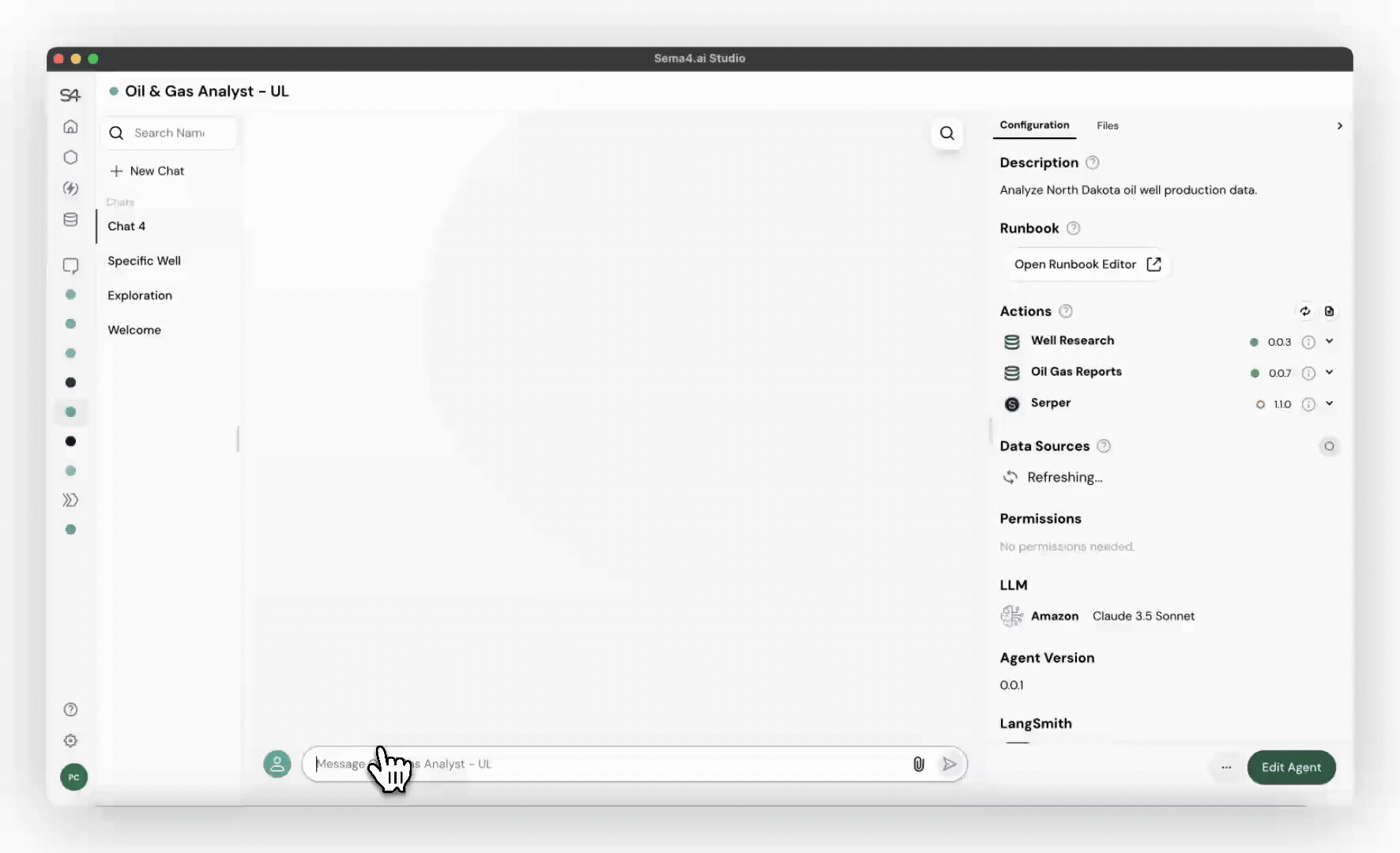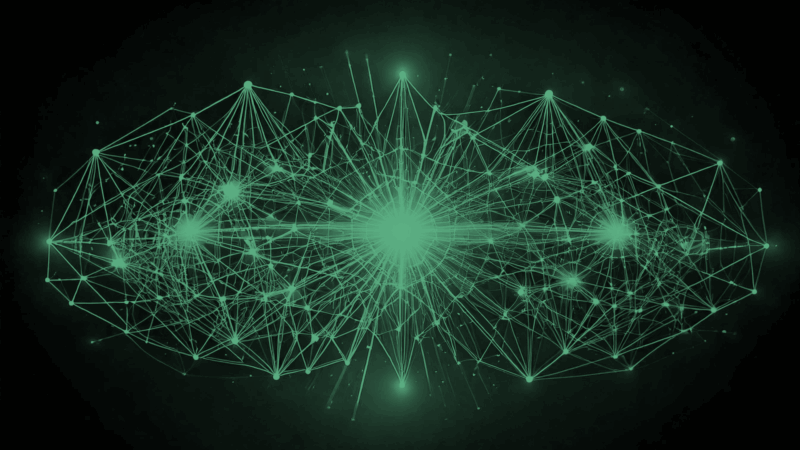The enterprise AI revolution through intelligent agent-knowledge integration
A knowledge based agent in artificial intelligence represents the convergence of structured knowledge representation with intelligent reasoning capabilities, creating AI systems that can understand, remember, and act upon enterprise information with unprecedented accuracy. Unlike simple generative systems, knowledge-based agents combine persistent knowledge storage with sophisticated reasoning engines to make intelligent decisions in complex business environments. As organizations seek AI solutions that can handle nuanced scenarios while providing explainable outcomes, the integration of knowledge-based agents with enterprise knowledge systems has emerged as the cornerstone of trustworthy business automation.
The importance of knowledge representation and reasoning in AI extends far beyond academic concepts; it’s the foundation that enables AI agents to work with facts rather than fiction. When Sema4.ai Agents leverage our knowledge bases, they transform from pattern-matching systems into intelligent partners that understand your business context, remember previous interactions, and provide grounded responses with complete source attribution.
What is a knowledge-based agent?
A knowledge based agent is an AI system that stores information in a structured knowledge base and applies logical reasoning to make decisions and solve problems. Unlike simple reflex agents that respond to immediate inputs, knowledge-based agents in artificial intelligence maintain a persistent repository of facts, rules, and relationships that they can query and update over time.
The fundamental difference lies in their architecture. While basic AI systems process inputs with limited context, knowledge-based agents build and maintain comprehensive understanding of their domain. This enables them to infer new knowledge from existing facts, solve complex problems by combining multiple pieces of information, adapt as new information becomes available, and provide explanations based on logical reasoning.
In the Sema4.ai platform, this is enabled by the seamless integration between our enterprise AI agents and knowledge bases. Our knowledge bases act as long-term memory for agents, addressing critical LLM limitations: limited context windows become unlimited knowledge capacity, no persistent memory transforms into continuous learning, hallucination risks are reduced through grounded responses, and generic knowledge evolves into enterprise-specific intelligence.
Knowledge representation in AI: Sema4.ai’s vector-native architecture
What is knowledge representation in AI? Knowledge representation is the method by which AI systems encode, store, and organize information to enable reasoning and decision-making. In traditional systems, this includes propositional logic for simple facts, first-order logic for complex relationships, semantic networks organizing concepts as graphs, and production rules encoding if-then statements.
Sema4.ai Knowledge Bases transform your organization’s collective intelligence—from institutional policies and expert knowledge to historical decisions and expert answers scattered across documents, communications, and databases—into a unified, semantically searchable repository that preserves context and relationships between information. When agents query these Knowledge Bases, they’re not just retrieving isolated facts but accessing the encoded expertise and decision-making patterns of your entire organization, enabling them to provide responses that reflect your company’s accumulated knowledge, context, and business logic rather than generic AI training data.
Our knowledge bases serve as semantic layers connecting to vector storage systems like pgvector, automatically generating embeddings using your specified models. This creates comprehensive knowledge repositories including enterprise documents (PDFs, reports, manuals), communication archives (email threads, Slack conversations), structured business data (database tables, CRM records), and metadata with business context.
Building a Sema4.ai Knowledge Base is as simple as defining your KB using our SDK, then populating it with documents and files that automatically generate semantic embeddings. Once your knowledge is indexed, agents can query your enterprise knowledge through natural language and provide grounded, cited responses based on your organization’s specific data and business context.
What makes Sema4.ai unique is how agents interact with this knowledge through our Actions, where agents can call knowledge base queries directly from their Runbooks, passing user questions to retrieve relevant information and using grounded knowledge to inform reasoning with complete source attribution.
Reasoning in knowledge-based agents: from knowledge to intelligent action
What is reasoning in knowledge-based agents? Reasoning is the process by which agents use stored knowledge to draw conclusions, make decisions, and determine appropriate actions. Classical systems employ forward chaining (reasoning from facts to conclusions) and backward chaining (working from goals to supporting evidence).
Sema4.ai Agents enhance classical reasoning with modern AI capabilities, creating hybrid systems that combine explainability of knowledge-based reasoning with flexibility. Our agents use semantic reasoning through vector embeddings to understand conceptual relationships, multi-source knowledge synthesis combining information from different sources, contextual inference applying domain-specific reasoning, and grounded response generation with citations to specific knowledge base sources.
The reasoning process follows a sophisticated workflow: agents query knowledge bases using semantic search, analyze retrieved knowledge in business context, apply logical reasoning to generate responses grounded in organizational knowledge, and provide source attribution for complete transparency. This enables agents to handle complex enterprise scenarios like contract analysis, regulatory compliance, and strategic planning while maintaining complete transparency in decision-making.
Transparent reasoning allows organizations to understand AI agent decision-making

The three key steps of knowledge-based agent operation
What are the three key steps of a knowledge-based agent? The operational cycle follows a systematic process enabling continuous learning and adaptation:
1. Perception and knowledge query – When agents receive input (user questions, business events, document uploads), they immediately query relevant knowledge bases to gather contextual information. This transforms simple input processing into knowledge-informed perception where agents understand not just what is being asked, but broader business context.
2. Knowledge-informed reasoning – Agents combine retrieved knowledge with reasoning capabilities to analyze situations, identify relevant precedents, and determine appropriate responses. This includes semantic search across multiple knowledge bases, relevance filtering, cross-referencing information from different sources, and applying business logic and domain expertise.
3. Grounded action and learning – Agents execute decisions based on knowledge-informed reasoning, providing responses with complete source attribution. The system includes continuous learning as Knowledge Bases evolve with new information, enabling agents to benefit from updated enterprise knowledge without requiring retraining.
The key insight is that knowledge representation defines what agents know through knowledge bases, while reasoning determines how they apply that knowledge to solve business problems.
Real-world examples of knowledge-based agents in action
What is an example of a knowledge-based agent in AI? Knowledge-based agents excel across various domains, from classical AI applications to modern enterprise applications.
Sema4.ai’s platform enables sophisticated knowledge-based agents across enterprise scenarios:
Legal document intelligence agent maintains knowledge bases containing preferred legal language, regulatory requirements, and organizational policies. When creating legal documents, it queries Knowledge Bases for appropriate clauses, ensures regulatory compliance, and generates consistent documents while providing source attribution for every recommendation.
Help desk agent combines knowledge bases of product documentation, support histories, and policy manuals to provide comprehensive support by semantically searching across knowledge sources, identifying historical patterns, and providing step-by-step guidance with complete context.
HR policy assistant agent leverages knowledge bases of employee handbooks, policy documents, and regulatory requirements to interpret policies in specific contexts, provide benefits explanations with regulatory backing, and ensure consistent policy application across the organization.
What distinguishes Sema4.ai’s approach is the seamless integration workflow: developers create knowledge bases using our SDK, package queries into action packages, and agents automatically gain access through the Runbooks created by business teams.
Benefits and challenges of enterprise knowledge-based agents
Knowledge-based agents offer compelling advantages for enterprise applications, particularly in areas requiring transparency, consistency, and regulatory compliance.
Key benefits: logical reasoning and explainability enable agents to provide clear justifications by citing specific Knowledge Base sources, crucial for regulatory compliance and user trust.
Enterprise-specific accuracy results from agents working with organizational knowledge bases rather than generic training data. Persistent knowledge and continuous learning occur as Knowledge Bases evolve with business changes. Semantic understanding beyond keywords enables natural interactions and accurate knowledge retrieval.
Challenges and solutions: knowledge base maintenance requires ongoing attention to ensure current information. Sema4.ai addresses this through comprehensive management tools, version control, and automated data ingestion. Query performance at scale can impact response times as knowledge bases grow. Our vector-native architecture and intelligent caching ensure efficient access even from large repositories. Knowledge quality control becomes critical as Knowledge Bases expand. Sema4.ai provides metadata filtering, relevance scoring, and source authority ranking to prioritize reliable information.
The future of knowledge-based agents: hybrid intelligence
The future lies in hybrid approaches combining structured knowledge representation with advanced AI capabilities, leveraging explainability of knowledge-based reasoning with adaptability of modern AI. Hybrid architectures integrate knowledge bases with natural language processing and reasoning models while maintaining complete transparency.
Sema4.ai’s integrated platform represents this hybrid future today, combining structured knowledge bases with advanced language models, enabling natural language instructions while maintaining access to grounded enterprise knowledge. This creates intelligent systems that understand and adapt to organizational needs while providing the explainable outcomes enterprises demand.
Knowledge-based agents are the foundation of enterprise AI intelligence
Knowledge-based agents represent a fundamental advancement in AI, combining structured knowledge representation with logical reasoning capabilities. When integrated with comprehensive knowledge bases like Sema4.ai’s platform, these agents transform into intelligent partners that understand business context and reason about complex scenarios.
Our approach addresses core enterprise AI challenges through unlimited enterprise context via knowledge bases, grounded responses with source attribution, business user empowerment through natural language runbooks, and seamless integration workflows. Organizations investing in integrated agent-knowledge platforms today will leverage AI’s full potential while maintaining control, transparency, and reliability that business success requires.
Ready to transform your enterprise knowledge into intelligent agent capabilities? Explore the Sema4.ai Enterprise AI Agent Platform to discover how our integrated approach delivers measurable results through knowledge-based intelligence.
Explore our AI Agent Learning Center
Learn more about Sema4.ai Agents
Learn more about Sema4.ai Knowledge Bases


